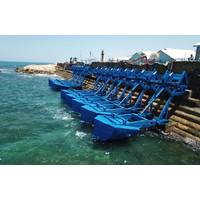IMCA Publishes Revised Guidance on Personnel Transfer
One activity specific to offshore operations is the transfer of personnel between vessels and other offshore structures. Such transfers can include movement of personnel at crew and shift change, from vessel to vessel, and between vessels, offshore structures, barges, and crew boats, as well as to and from the quayside. Safety of transfer is of paramount importance.
The International Marine Contractors Association (IMCA) has revised its ‘Guidance on the transfer of personnel to and from offshore vessels and structures’ (IMCA SEL 025 Rev.,1 / IMCA M 202 Rev. 1) to include the equipment and practices that are used in the offshore renewable energy industry.
“Within the offshore industry, particularly in the offshore renewable energy industry, there has been an increase in the requirement for the transfer of personnel to offshore vessels and structures, with this trend set to continue,” explains IMCA’s Technical Director, Jane Bugler. “Personnel transfers in the offshore renewable energy industry primarily involve transfer to and from vessels of 10m to 30m in length, operating independently from a mother vessel or from a port.
“Our document provides guidance for the offshore industry on the safe transfer of personnel at sea, covering risk assessment, training and competence, responsibility, equipment and communications; and focuses on the main methods of personnel transfer between vessels, offshore structures and the quayside.”
The primary methods of personnel transfer are: gangways, bridge or accommodation ladders. These include motion-compensated hydraulic gangways, a small boat or launch, and a larger crew support vessel. For each case, the document covers the main safety issues and gives information about the equipment that may be involved, such as ‘surfers, as well as special duties or responsibilities of personnel involved, particularly with regard to communications.
The document does not cover personnel transfer by helicopter which is a separate subject adequately addressed elsewhere.






